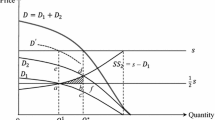Abstract
The President and the Senate bargain over the appointment of the Head of a key government department. The operating unit of the department has private information about its operating environment. We model the appointment process as a constrained delegation of policymaking to the operating unit (agency). When the Senate is sufficiently close to the agency the President has to give the agency more authority. On the other hand, given the Senate’s ideal point, when the information is more precise the President can tighten delegation bounds.
Similar content being viewed by others
References
Alonso, R., & Matouschek, N. (2008). Optimal delegation. Review of Economic Studies, 75, 259–293.
Calvert, R. L., Cubbins, M. D., & Weingast, B. R. (1989). A theory of political control and agency discretion. American Journal of Political Science, 33, 588–611.
Chang, K. H. (2001). The president versus the Senate: appointments in the American system of separated powers and the Federal Reserve. Journal of Law, Economics and Organization, 17, 319–355.
Chang, K. H., de Figueiredo, R. J. P., & Weingast, B. R. (2001). Rational choice theories of bureaucratic control and performance. In Shughart II, W. F., & Razzolini, L. (Eds.), The Elgar Companion on Public Choice. Cheltenham: Edward Elgar Press.
Gilligan, T. W., & Krehbiel, K. (1987). Collective decision-making and standing committees: an information rationale for restrictive amendment procedures. Journal of Law, Economics and Organization, 3, 287–335.
Hammond, T. H., & Hill, J. S. (1993). Deference or preference? Explaining Senate confirmation of presidential nominees to administrative agencies. Journal of Theoretical Politics, 5, 23–59.
Holmström, B. R. (1984). On the theory of delegation. In Boyer, M., & Kihlstrom, R. E. (Eds.), Bayesian models in economic theory. New York: North-Holland.
Martimort, D., & Semenov, A. P. (2006). Continuity in mechanism design without transfers. Economics Letters, 93, 182–189.
McCarty, N., & Ragazhian, R. (2000). Hitting the ground running: the timing of presidential appointments in transition. In Kumar, M. J., Shapiro, R. Y., & Jacobs, L. R. (Eds.), Presidential power: forging the presidency for the 21st century. New York: Columbia University Press.
Melumad, N. D., & Shibano, T. (1994). The securities and exchange commission and the Financial Accounting Standards Board: regulation through veto-based delegation. Journal of Accounting Research, 32, 1–37.
Moe, T. M. (1990). The politics of bureaucratic structure. In Chubb, J. E., & Peterson, P. (Eds.), Can the government govern? Washington: Brookings Institution.
Moe, T. M. (1991). Politics and the theory of organization. Journal of Law, Economics and Organization, 7, 106–129.
Moulin, H. (1980). On strategy-proofness and single-peakedness. Public Choice, 35, 437–455.
Mylovanov, T. (2008). Veto-based delegation. Journal of Economic Theory, 138, 297–307.
Niskanen, W. A. (1971). Bureaucracy and representative government. Chicago: Aldine-Atherton.
Nokken, T. P., & Sala, B. R. (2000). Confirmation dynamics: a model of presidential appointments to independent agencies. Journal of Theoretical Politics, 12, 91–112.
Romer, T., & Rothenthal, H. (1978). Political resource allocation, controlled agendas and the status quo. Public Choice, 33, 27–43.
Semenov, A. P. (2005). Lobbying games. Dissertation, University of Toulouse.
Snyder, S. K., & Weingast, B. R. (2000). The American system of shared powers: the President, Congress, and the NLRB. The Journal of Law, Economics & Organization, 16, 269–305.
Author information
Authors and Affiliations
Corresponding author
Rights and permissions
About this article
Cite this article
Semenov, A.P. Bargaining in the appointment process, constrained delegation and the political weight of the Senate. Public Choice 136, 165–180 (2008). https://doi.org/10.1007/s11127-008-9287-9
Received:
Accepted:
Published:
Issue Date:
DOI: https://doi.org/10.1007/s11127-008-9287-9




